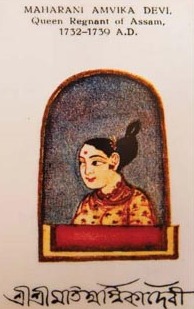|
Ambika, Bar Raja
 Ambika, Bar Raja (born Draupadi; died 1738) was the Chief Consort of Ahom King, Sutanphaa. She became Bar Raja, shortly after the death of her older sister, Phuleshwari. She is known for constructing the Sivasagar Sivadol and the Sivasagar Tank. She was a great patron of learning and education.[1] Life and marriages Ambika was born with the name Draupadi.[1] Draupadi was married to Ramnath Solal Gohain of the Miri Handikoi family, by whom she had two sons.[1][2] Draupadi's elder sister, Phuleshwari, died in 1731.[3] The King, Siva Singha, then forcibly married Draupadi and forced her to separate from her husband. Her two sons from her previous marriage then lived with their father and Draupadi took on the name Ambika. They had a son, Ugra Singha, the Tipam Raja.[4][5] Ambika was a great patron of art, at her patronage, the famous manuscript on elephantry Hastividyarnava was commissioned. Bhagavada book VI, and Dharma Purana composed by Kavichandra Dvijya and illustrated by Badha Ligira, are another important works of art at that time.[5] Ambika died in 1738 at north of Chinatali.[6] The King in 1739 married Akari Gabhuru, daughter of deposed Solal Gohain, of Madurial family, and conferred her the title of Bar Raja, and renamed her as Sarbeswari.[7] References
|
||||||||||||||||||||||
